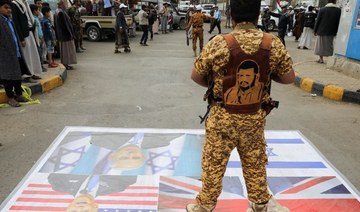AL-MUKALLA: Yemen’s Houthi militia would continue to ensure conflict in the Red Sea even if the Israel-Hamas war ended, according to the chairman of Yemen’s Presidential Leadership.
Speaking at the Munich Security Conference on Saturday, Rashad Al-Alimi said the only way to remove the danger was through military operations.
He said current strikes by the US and UK would not deter Houthi threats, but vowed to defeat the organization and end its attacks if his government received international backing and Iran was pressured to end its military support.
“To put an end to this Houthi piracy, we must address the threat’s origins and source; this can only be accomplished by restoring state institutions, putting an end to the coup and applying maximum pressure on the Iranian regime,” the Yemeni leader said.
Since the Houthis began the Red Sea strikes in November, Yemen’s government has sought international assistance to evict them from Yemeni territories under their control. Al-Alimi warned that if they were not destroyed, they would use the Red Sea as a negotiating chip. He blamed Iran for financing the Houthi assaults as well as Yemen’s instability.
“As long as Iran continues to back this militia and provide weapons to it, it will continue to pose a danger to Red Sea shipping and may blackmail other regions in the future,” said the Yemeni leader.
The Houthis have launched hundreds of drones and missiles against commercial and naval ships in the Red Sea, Bab Al-Mandab, and the Gulf of Aden over the past four months. The organization claims to exclusively strike ships linked to or destined for Israel, forcing the country to allow humanitarian supplies to reach the besieged Gaza Strip. In response to the assaults the US, supported by several partners, has carried out dozens of strikes on military installations, drone and missile launchers, and other sites in Houthi-controlled Yemen.
Similarly, Yemen’s information minister, Moammar Al-Eryani, said he had sent letters to the CEOs of key social media firms requesting that accounts for Houthi officials and the militia’s media propaganda material be deleted from their platforms.
Posting on X, the Yemeni minister sent letters bearing his stamp and signature to the platform’s leaders, as well as those of Facebook, TikTok, Telegram and Instagram, urging them to comply with the US designation of the Houthis as terrorists. “We confirmed that Houthi militia pages on social media platforms, whether official or affiliated with individuals (leaders, media figures, activists), are spreading terrorist ideas, promoting hate speech, inciting violence and murder and brainwashing children and recruiting them,” Al-Eryani said.
Meanwhile, Yemen’s embassy in Cairo said on Sunday that Brigadier General Hassan Farhan Al-Obeidi, the head of the Yemen army’s military production department, had been discovered dead from stab wounds. Egyptian officials are investigating.
Baligh Al-Mekhlafi, information counselor, told Arab News the embassy had received an alert about Al-Obeidi’s death shortly before 2 a.m. The Yemeni officer had arrived in Cairo 20 days earlier, traveling to Turkiye before returning to Egypt a week ago.
“We will share any fresh information that we get on the case,” Al-Mekhlafi said.
Al-Obeidi has been regarded as a military specialist in the production of local armored vehicles and weaponry since the days of former President Ali Abdullah Saleh. When the Houthis seized power in late 2014, he joined anti-Houthi forces and participated in military action against them in Marib, his home province.



























